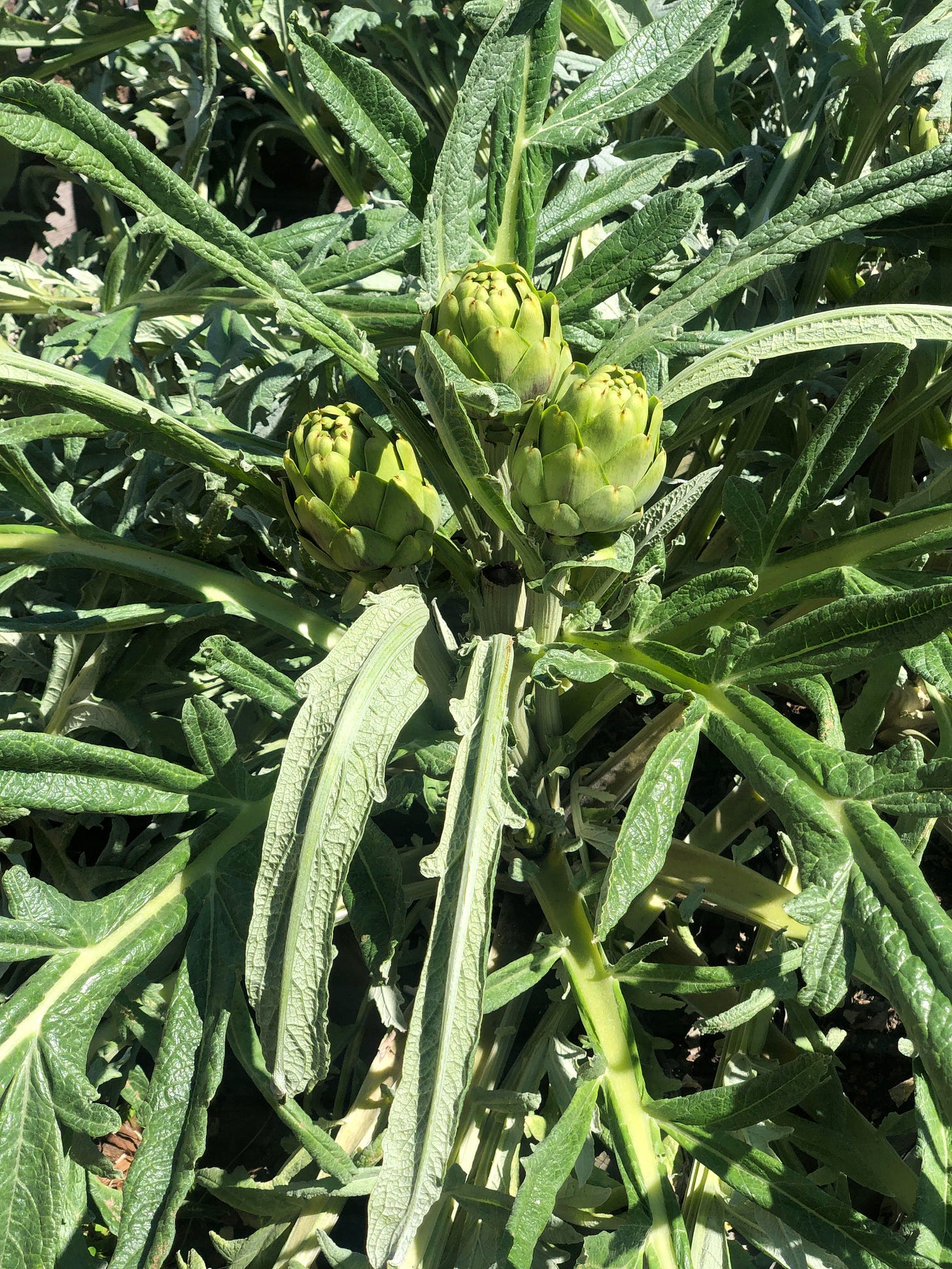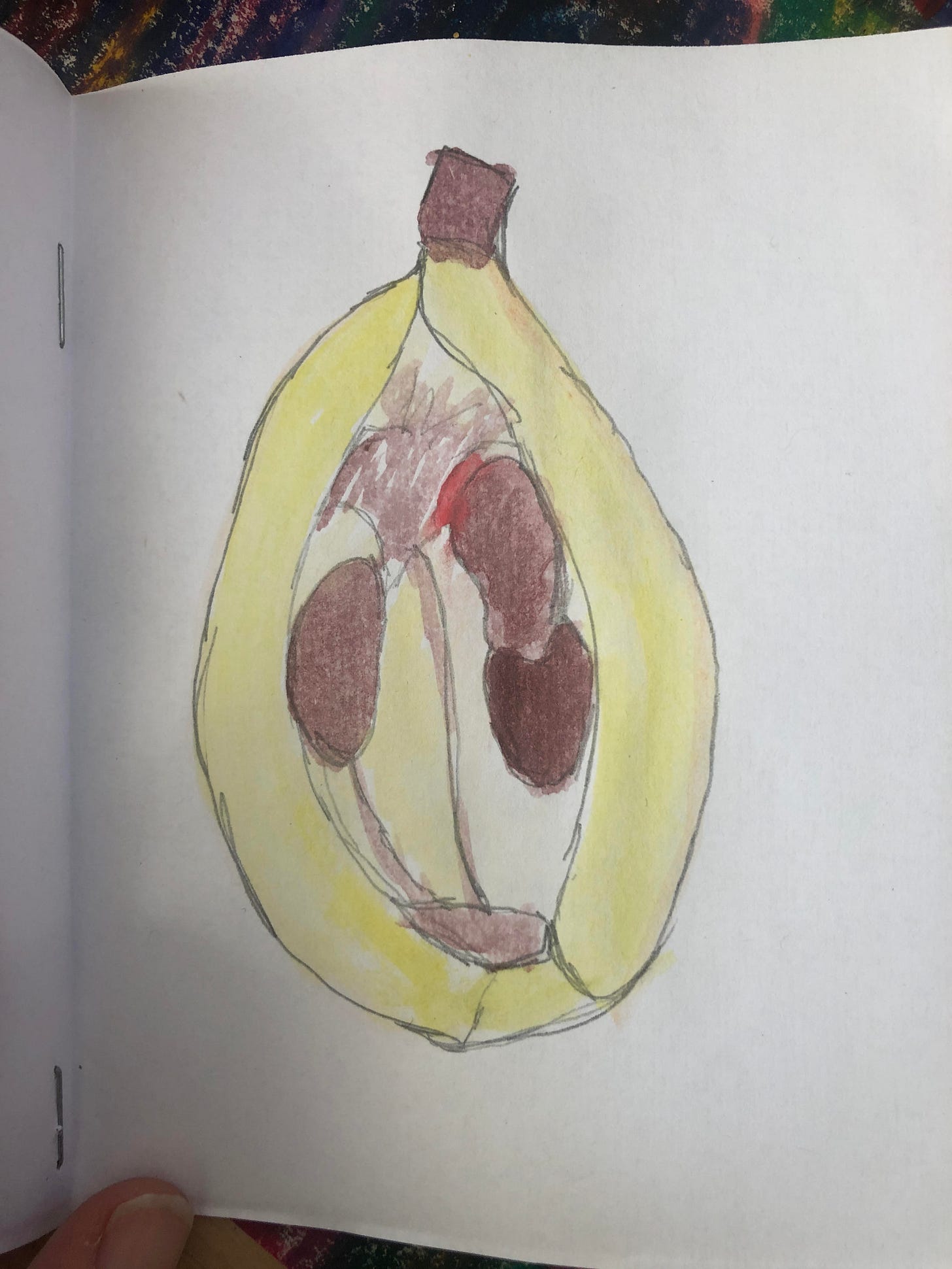I found myself actually feeling the smallest twinge of anticipatory nostalgia for this moment in the shower yesterday.
My life has shrunk down to a pinhole from it’s former floodlight. While I used to live by the frenetic drumbeat of a finely tuned Google Calendar, these days I grab a piece of scrap paper in the morning and handwrite a few things: drawing class, naptime, outdoor adventure.
The nap is for the kids, not me; nap, for me, means “work your ass off.” And this is the part I will not miss: the diverse parts of who I am squeezed into the tiniest fractions of non-caretaking time.
Trust me, like you, I spend far more of my time fantasizing about getting out, but I’m also interested in the parts of me that are comforted by the staying in. The lowering of expectations. The loosening of time. The quiet, diligent intimacy of these 1,200 square feet and the block surrounding them.
I actually studied the shape of an artichoke in the garden yesterday while drawing it for my dad. He loves artichokes. We don’t talk as much as I’d like, but when I put the drawing in a box--along with masks and gloves and directions about how to grocery shop safely--I felt like a version of myself that I would really like to be more often.

This is the part of the essay where I assure you that the beauty I’m noticing is not worth the lives that have been lost (officially in excess of 20,000 to date, with many more unofficially). I would tear up that artichoke painting a million times over, among so much else, if it meant that so many people didn’t have to grieve alone and essential workers didn’t have to risk their lives, day in and day out. My rage is not gone. It’s pulsating underneath, next to, around all this domestic appreciation. I think both can exist. They must.
I’ve been thinking about writing a love letter to my back fence neighbor (spoiler alert, Sarah). We text one another when we are losing our minds throughout the day and then cap it off with little triumphs at night (I made brisket. I didn’t murder my children. I read a poem in the bathroom.) We pass one another blocks of cheddar cheese and Lego kits over the fence. She saved Easter by producing a gallon-size ziplock bag filled with jelly beans.
Sarah is one of the most unconditionally loving and hilarious humans that I’ve ever met and now it feels like we are modern Rosie the Riveters--bandanas around our faces, toddlers hanging off our giant biceps, resilient as f. I highly recommend being stuck next to someone who is one part psychologist, one part stand up comedian, and one part cooking show champion if you ever again find yourself in the midst of a global disaster. (Maybe this was the love letter, Sarah; not sure I’ll have time for a legit one.)
Meanwhile, the girls and I are finally using all of the shit we’ve accumulated in our house. Reading the books we never read (There is so much wisdom for a pandemic to be found in children’s books! Can’t go over it. Can’t go under it. We’ll have to go through it). Depleting the art supplies that have long seemed superfluous. Falling in love with the neglected stuffies. Doing all the puzzles. Playing all the board games.
We’re also using all the shit in the house to make the shit we don’t have in the house: an egg carton became a spaceship control panel, an astronaut helmet became a convection oven, an Etch-a-sketch became an x-ray machine, laundry baskets are gunny sacks, and the landing of our stairs is the stage (may I recommend “Into the Unknown” from Frozen II as a perfect pandemic song?). If you need an ice cream cone, just flip the balance bike upside down and spin the wheel, and if you need a clubhouse just throw out all of mom’s shoes and move into her closet. All brought to you by three- and six-year old imaginations, which live up the hype.
I have remembered how to follow my own and Maya’s curiosities down rabbit holes. Her reading progress may have stalled a little, but we now know that loquat trees are found mostly in tropical climates, the kidneys clean half a cup of blood every minute, and that the first documented case of coronavirus was on my 40th birthday. Who’s to say which kinds of skills and knowledge will actually matter most in the end? I trust my girl’s intuition more than the ed tech entrepreneurs we’ve never met (no offense).

A loquat study. I’d never tasted one until now.
Which is all to say, it’s nice to live within temporary limitations that teach you something about abundance. When I think about the day that the world opens up again, I am overjoyed at the prospect of dropping my kids off somewhere and driving away (!!!), gathering with my friends, and walking in the woods without a mask, but I instantly feel overwhelmed at the prospect of schedules and stuff. I don’t want to go back to our former accumulation or frenetic pace. I don’t want to stop texting Sarah my little triumphs. I don’t want to forget about the artichokes in the garden.
I don’t ever want to forget this happened--the grief and the beauty of it. I’m not even sure that will be possible, but if it were, I wouldn’t want it. I don’t want to vote like it didn’t happen. I don’t want to eat like it didn’t happen. I don’t want to consume like it didn’t happen. I don’t want to schedule like it didn’t happen. I don’t want to mother or daughter or befriend or neighbor like it didn’t happen. I don’t want to sit inside this little life, noticing and appreciating and breathing, like it didn’t happen.
There is unnecessary suffering all around me, and inside of me, too, but there is also necessary meaning. May we hold on to that.




This is absolutely spot on. Thank you for sharing and capturing what so many of us are feeling right now.
I'm carefully assembling Courtney's prolific writings in this "Examined Life" newsletter because I think that they are among her very best--and that's saying a lot. The stream of sympathetic responses to her forthright expression of rage certainly expressed my own feelings. I've always had a problem, though, about having desirable (or inevitable) effects of anger, fury or rage. I alluded to this earlier but didn't complete my thoughts, so I'll try to continue with them now, yet really wishing that I could somehow engage with Courtney personally, even joining these amazing conversations with Sarah.
So, on the one had, we know about the consistent warnings against anger, even insistence that it must be severely controlled because it's an adversary, not ally, starting with Buddha's "Dhammapada" and other religions, continuing with Gandhi and the Engaged Buddhists, especially books entitled "Anger" and "Healing Anger" by Thich Nhat Hanh and the Dalai Lama respectively. Revered counsel from spiritual sages over the ages seem predictable, but less likely perhaps is a book by Martha Nussbaum, "Anger and Forgiveness"(2016), renowned philosopher, who announces her theme in the intro. that "anger is not only not necessary for the pursuit of justice, but an impediment to the generosity and empathy that help to construct a future of justice." She allows that "Anger may still have limited utility," but again, citing an illustrious (secular) model like Nelson Mandela, "leader of a revolutionary movement," emphasizes that he's revered for forgiveness not fury. (p.8).
Staying with Mandela as an exemplar of the kind of leader that the world needs now, there's the excellent compilation of his teachings by Richard Stengel (a close associate) who observed that "He understood that expressing his anger would diminish his power, while hiding it increased it." So, along with Desmond Tutu ("No Future without Forgiveness") Mandela determined to forgive and forget. (p.98).
I know, Courtney, how much of an inspiration Mandela was to you because I have before me the treasured framed photo of his cell on Robben Island that you personally took and gave me. Concluding my lecture on anger, there's the story of Malcolm X's incredible journey. Many recall his rage but forget his conclusion near the end of his short life that "the true brotherhood I had seen in the Holy World had influenced me to recognize that anger can blind human vision." (Autobiography, ch 19, p.382).
All of this is not intended as a display of pedantry or to deny in any way the distress that I share with Courtney and those who empathized with her authentic eloquence. I'm cooped up in a 1200' apartment now, unable even to go outside, but I can still enjoy lengthy conversations with Sharron (we celebrate our 59th next month, hoping that our children can join us by then). Through the marvels of google meeting (not zoom), I'm able to reach my high school Ethics class despite the closure of all public schools for the rest of term. And, Courtney, Barnard is alive with online courses, and even I, in my dotage, have participated in one called "Change and Climate Change," starting with Gandhi's enduring maxim, "YOU must be the change..."
Many thanks for giving me this opportunity to post. Of course, Sharron and I wish that we could walk with you and your awesome family in Portland's sublime forest as we did last May. Thinking of "anticipatory nostalgia," can we do that again this summer? Love, Dennis